Kendall (Kendall Book 5) Read online
Kendall
John Holt
Phoenix Publishing – Essex - UK
© John Holt – July 2014
DEDICATION
In memory of my brother
Brian George Holt
October 11th 1951- November 5th 2013
Brian and his dog Bobbie
CONDITIONS OF SALE
John Holt has asserted his right under the Copyright, Designs and Patents Act 1998 to be identified as the author of this work.
All rights reserved. No part of this publication may be reproduced, stored in a retrieval system, or transmitted in any form or by any means, electronic, mechanical, photocopying, scanning, recording or otherwise, without the prior permission of the publisher, except by a reviewer who may quote brief passages in a review to be printed in a newspaper, magazine or journal.
This book has been sold subject to the condition that it shall not, by way of trade or otherwise, be lent, resold, hired out, or otherwise circulated without the publisher’s prior consent in any form of binding or cover other than that in which it is published and without a similar condition including this condition being imposed on the subsequent purchaser. All characters in this publication are fictitious and any resemblance to real persons, living or dead is purely coincidental.
British Library Cataloguing in Publication Data.
A CIP catalogue record for this book is available from the British Library
Printing History
First published by Phoenix, Essex, UK, in July 2014
ISBN
978-1-291-93770-1
Preface
The story that follows is totally fictitious. It is a story, nothing more and nothing less. All places and persons included in the story are totally imaginary, and any similarity to actual persons alive or dead, is totally co-incidentally, and unintentional.
Although many of the places mentioned do actually exist, it is only the names that are real in the story. They have, however, been changed as necessary for my own purposes, i.e. to serve the needs of this story.
* * *
The photographs of “Kendall’s grandfather, and father,” are, in fact, photographs of my grandfather and father. The uniforms they are wearing are British Army uniforms. They are included as a tribute. Could I ask any American readers to just go along with me on this? Thanks.
The photograph used on the cover is entitled ‘Intersection’. It was taken on 27th May 2009 by Catherine L. B. Callemder. Her permission to use the photograph is greatly appreciated.
My thanks also go to Michael and Barbara Morton for their un-tiring support and help.
I am grateful to Lauren Ridley, Cherryloco Jewellery for allowing me to base the Phoenix logo on her design.
John Holt
Chapter One
Victor Lowry
Throughout its one hundred and eighty year history the Virginia Sentinel had been no stranger to controversy and slander, ranging from bribery and corruption of local politicians during the election campaign of Theodore Roosevelt; to deliberately misleading the public regarding the Cuban Missile crisis. It could be said that the newspaper almost invited disagreement, and argument. Some said that it actually thrived on confrontation.
Continually changing which side to support, the worst period in its history was possibly at the height of the Civil War, when, seemingly, it couldn’t make up its mind whether to support the Confederacy, or to throw its weight behind President Abraham Lincoln.
* * *
At the present time the Sentinel, along with several other newspapers, was embroiled in a scandal centered on allegations relating to phone hacking. Not just phone hacking, but accessing private emails, and voicemails. Allegations vehemently denied by the newspaper, and equally vehemently alleged by a number of celebrities. There had been no other news for weeks. Each day that passed more and more so-called A-listers came forward with stories of their privacy being invaded. Stories that, generally, received little sympathy, if any, or were dismissed out of hand. After all celebrities courted publicity didn’t they? Besides they were in the public eye, and as such they had no privacy. More recently, and more disturbingly however, there were allegations that the phones of ordinary members of the general public were also being hacked, especially those involved in high profile criminal investigations.
Still the newspaper continued to deny any knowledge or involvement, and condemned such activity out of hand. The Sentinel would never stoop to such action merely to get a story. The very idea was un-thinkable. Besides phone hacking was a criminal offence wasn’t it?
Then there came allegations of payments being made by the newspapers, to police officials for news items. Once again these allegations were denied both by the police, and by the media. Nonetheless, the allegations continued unabated.
* * *
A growing group of Senators and a senior Republican congressman have been calling for the authorities to investigate the allegations. Democratic Senator Robert Menendez, who wrote to the attorney general to urge an investigation, said that the claims that newspapers sought to "exploit information about... personal tragedies for profit" needed to be probed.
Recently there had been a major development, and the Government had announced the setting up of a public enquiry, to be headed by Senator Dan Warwick, chairman of the Senate Media Committee. The first hearings were due to start in a little over a month’s time, although what powers it would have were still to be determined, and several newspapers were skeptical. As were the general public.
“A waste of time,” was one view.
“A waste of money,” was another. “And that’s our money!”
“You’ll see it’ll make no difference anyway,” was a third.
Many people considered that it was un-necessary. There were already rules and regulations in place designed to safeguard the general public. Codes of practice had been drawn up long ago by the media, as a means of self regulation. Furthermore there were laws relating to phone tapping, phone hacking, and invasion of privacy. Many people considered that instead of setting up an enquiry the newspapers involved should just be taken to Court. After all phone hacking was an illegal activity wasn’t it? Let the law deal with them.
This type of enquiry very rarely achieved anything worthwhile anyway. It would take months and months to reach a conclusion, and put forward any recommendations. Even then it was most unlikely that any newspaper would feel bound by those findings and recommendations. Lip service that’s all it would be, nothing but words. An act, a show put on by the Government to say look we are doing something.
* * *
Victor James Lowry had been CEO and Chairman of the newspaper for just over ten years. He had built the business up into a vast media empire.
He knew that sooner or later he would be called to give evidence at the Warwick enquiry. He also knew that all he had to do was to deny all knowledge of phone hacking, or accessing emails, and keep on denying it. In that regard he was well practiced, he had been doing that for at least the past ten months since the first allegations had surfaced.
He knew nothing about such activities. His newspaper knew nothing about such activities. His newspaper would never contemplate such action. He would never sanction such action. The allegations were untrue, un-founded, and malicious.
He looked at the newspaper lying on his desk. The headline in three inch thick black type said it all. ‘The Sentinel Denies Phone Hacking.’ The news item continued to explain that further allegations had come to light, and that irrefutable evidence had been handed to the police, together with names of particular reporters allegedly involved, including two on the editorial staff of the Sentinel itself. Once again all allegations were being strenuously denied.
Lowry pushed the newspaper to one side. He would think about that later, much later. Right now he had other things to think about. Things like ‘The Man of the Year’ presentation which he was due to give in a few days time.
Lowry sat back in his chair and pushed himself away from the desk. He started to stroke his chin. Just how had he been selected for the title, ‘Man of the Year’? His wealth perhaps; or maybe his position; or perhaps it was his power. He smiled. Certainly all three would have been enough, but he knew that it was more than that. At the end of the day it came down to one thing, and one thing only -fear. They were all afraid of him. The old saying came to mind – if you can’t beat them, join them. It was as simple as that. They were afraid of him, and thought by showing favor they would somehow be safe. They were safe alright, for the time being at least. He looked across to the corner of the room, to a metal filing cabinet. Inside were a number of files, files containing information on various people. They were his insurance policies.
He looked back at the desk and picked up the papers lying in front of him. He heaved a sigh and looked up at the ceiling. For the past couple of hours he had been working on a speech that he was due to deliver in a little over a week’s time.
“The Man of the Year,” he nodded, and started to smile. A fitting tribute he thought. It was going to be one of the events of the year. Many of his friends would be there, and many of his enemies as well. What did they say about friends and enemies? Keep your friends close, and your enemies closer.
Friends did he say. He shook his head. He didn’t have friends. He had no use for them. He didn’t need them. He had power, and he had control, what more did he need. People who claimed to be friends were only out for what they could get, and were only friends for as long as it suited their purpose.
So he didn’t have friends, but he certainly had enemies. There were many who were jealous of his business empire, and frightened of his power. There had been those, the foolhardy, who had tried vainly to bring him down. There were those who had tried to compete against him in business. They lacked his foresight, his vision, his aggression. They lacked his drive. He ran roughshod over everyone and anyone who stood in his way. If people got hurt what did that matter to him. If you don’t want to get burnt then stay out of the kitchen was Lowry’s watchword.
He started to read:
“Thank you all for being here today, to help me celebrate this award, Man of the Year. I am deeply honored, and it’s all thanks to you. After all I wouldn’t be here today if it weren’t for you. I couldn’t have done it without you. You have helped me more than you know.”
He paused and started to smile. A true statement if ever there was one. It had all been down to them, or at the very least how he had made use of them. They would never know exactly what they had done, or how they had been used. They had been so gullible, so easy to manipulate, to bend to his will, like taking candy from a baby, except that in this instance it was a lot more than just a few sweets.
So how was he to actually start his speech? He could hardly address his assembled audience as “my friends”, because clearly they weren’t. “My enemies” could prove awkward. He decided to leave it as it was, suitably vague. He looked back at the paper, and continued reading:
“It is just over ten years since I took over the helm at The Sentinel. In that short time it has evolved into the most influential newspaper in the eastern United States. But that growth has meant a lot of hard work, a lot of dedication, and ....”
“A lot of manipulation of very weak people,” he thought. Power, that’s what it came down to, power, and control. He started to smile. It had all been so easy.
“…dedication, and co-operation from my colleagues, and I thank them most sincerely. But we must not be complacent for now we face the greatest threat to the integrity of the press. The recent specter of phone hacking has brought into question the whole matter of the freedom of the press. The Sentinel is wholeheartedly against phone hacking, and welcomes the Warwick Enquiry and will co-operate fully. We must ….”
Then he began to wonder who would actually be attending the occasion. Lionel Harford, his one-time boss would certainly be there. As would Greg Tyler, and David Franklin, they would be too afraid not to attend. Then there was Tony Fletcher? Would he be there? Lowry shook his head. That was an unknown. You could never tell with Fletcher. He was unpredictable at the best of times. He would not wish to appear to be supportive by attending, but at the same time he would be curious enough to know what was being said about him. What about Martin Gardiner, would he attend? Most unlikely thought Lowry, especially after their last meeting just a day or two ago.
* * *
Lowry had started as a reporter on the Herald, a small town newspaper owned by the Sentinel group, soon after leaving school. He was given the task of reporting on many of the local events, the County show; the local football game; the carnival queen. Although there was nothing exciting, or of any real consequence, he soon learnt that some people were willing to do almost anything to get their name in the paper, to get their fifteen minutes of fame. And he was more than willing to take advantage of that situation.
Lowry soon began to realize that knowledge was power, especially if that knowledge could be used in a constructive way to further his ambitions. With power came control. He learnt how to manipulate people, for his own purposes. He began to compile dossiers on the local councilors, the shop keepers, the businessmen – his own colleagues, especially those who were in a higher position than himself. Anything and everything was included, no matter how apparently trivial it was. You never knew when a piece of information would prove useful.
It was a little over six months after starting his dossiers when an innocuous piece of paper came into Lowry’ possession. It was a letter sent by the editor of the Herald, and addressed to Harold Miller, the managing director of Miller and Co., a local building contractor. Lowry wasn’t exactly sure what it was about, but it seemed to involve payment of a sum of money in order to keep certain company information out of the public eye.
Although unsure of the significance Lowry took the letter to the editor and enquired as to what it all meant. The editor explained that it wasn’t anything of any great importance, and that it should just be forgotten. At the end of that week Lowry received an extra fifty dollars in his pay packet. A bonus, it was said. A few weeks later the office was visited by the local police and Mr. Harford, the editor was taken away.
Even then Lowry still did not fully appreciate the importance of the letter. Nonetheless, nothing more was said about the matter and his bonus continued to be paid regular as clockwork. In due course Mr. Harford returned to the office, and the affair appeared to be over.
As time went by Lowry continued to compile his dossiers. After a few short years Lowry had manipulated his way to the very top. Now he was head of the largest media empire on the East Coast, controlling twenty-seven newspapers, four radio stations, three television stations, and a film studio out on the west coast. Along the way he had also made many enemies, the majority of whom would be attending the ‘Man of The Year’ ceremony in the near future.
Lowry stood up, and went over to the drinks cabinet. There was a huge grin on his face. And why would all of his enemies be attending? Perhaps deep down they all loved and respected him? Maybe they liked to be seen with him? Lowry started to chuckle. They loathed him, despised him, but they also feared him. That’s why they would be there, because Lowry wanted it that way. They knew that Lowry could destroy them had he so chose. A snap of the fingers that’s all it would take. Just like that, as he snapped his middle finger and thumb together. He laughed loudly, and snapped his fingers again and again. As he did so he said a name. “Harford” – snap – destroyed. “Tyler” – snap – obliterated. “Franklin” – snap – extinguished. “Fletcher.”
Fletcher, he repeated in a whisper. Tony Fletcher.
Tony Fletcher was the founder, and Chief Executive Officer of We
st-Com Enterprises, a telecommunications company. He was a major business rival, and Lowry had offered to buy the company on numerous occasions, but Fletcher had always rejected his offers.
“Fletcher,” he said once again, and then snapped his fingers – “Deleted.”
Lowry sat down and pulled his papers towards him. He picked up his pen and continued to write. As part of his intended speech he would be embarking on an attack on Mr. Tony Fletcher. He also intended to announce that he would be entering the political arena. He intended to stand for election to Congress.
He looked over at the clock on the side cabinet. Then he stood up and walked over to a row of filing cabinets. He opened the third drawer down, marked E-F. There towards the back was the file he was looking for. He took it out. “Tony Fletcher” was written across the top in large black lettering.
Lowry returned to his desk, sat down, and opened the file. On the top was a newspaper cutting dated almost a year before. The headline simply read ‘Insider dealing’. The item that followed gave details of dramatic falls to the share price for West-Com, following very high prices the day previous. Millions of dollars had been wiped off the company value overnight. Only to be followed the next day by huge increases in the share price.
Lowry continued to read for a few moments more, then he heaved a sigh. He picked up the newspaper cutting, folded it and placed it inside an envelope. He then placed the envelope in his inside pocket.
Certainly there had been an enquiry, carried out by the Securities and Exchange Commission, but no wrong doing had been discovered, and no evidence of insider trading had been found. Share prices varied considerably, for all manner of reasons – world affairs; climate; finance; wars. Such variation was considered to be just another example of market trends being unpredictable. It was just one of those things that couldn’t be helped. The Stock Market was a gamble, and to make money you had to take risks. Stakes were high, so were the rewards, and so was the possibility of losses.

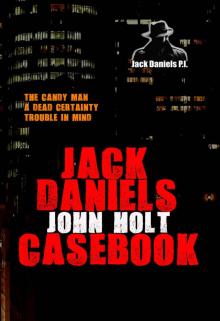 Jack Daniels - Casebook
Jack Daniels - Casebook A Case Of Murder (Kendall Book 6)
A Case Of Murder (Kendall Book 6)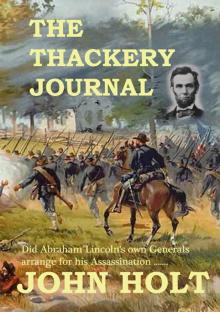 The Thackery Journal
The Thackery Journal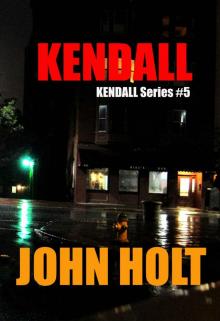 Kendall (Kendall Book 5)
Kendall (Kendall Book 5)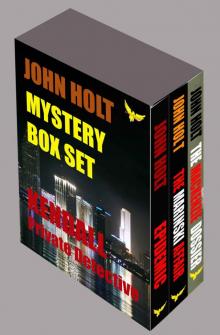 Kendall - Private Detective - Box Set
Kendall - Private Detective - Box Set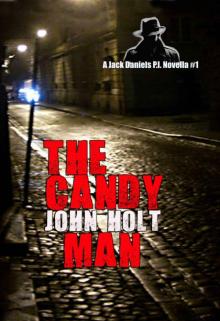 The Candy Man: A Jack Daniels P.I. Novella #1
The Candy Man: A Jack Daniels P.I. Novella #1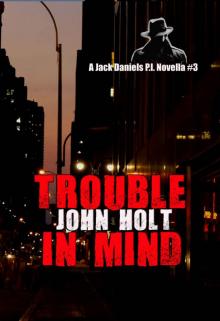 Trouble In Mind: Jack Daniels P.I. Novella #3
Trouble In Mind: Jack Daniels P.I. Novella #3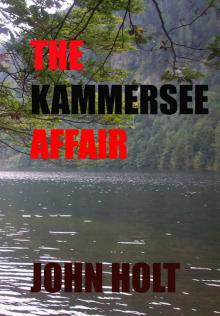 The Kammersee Affair
The Kammersee Affair